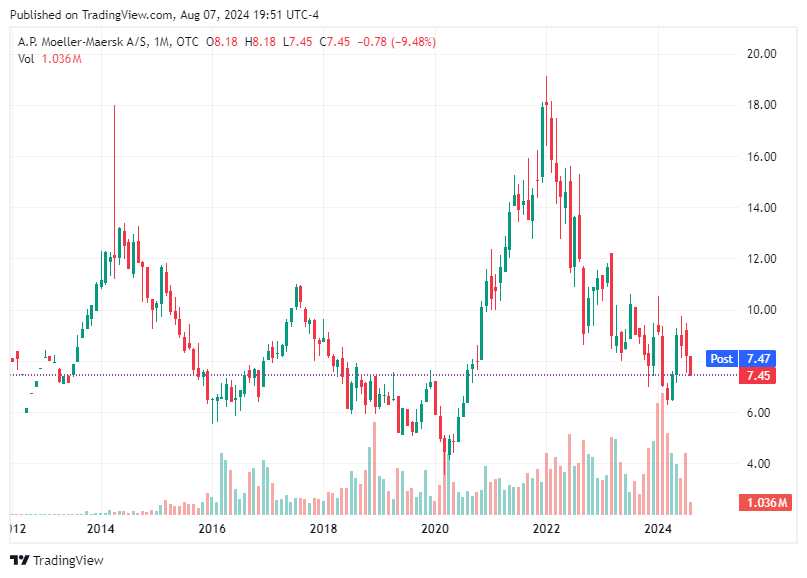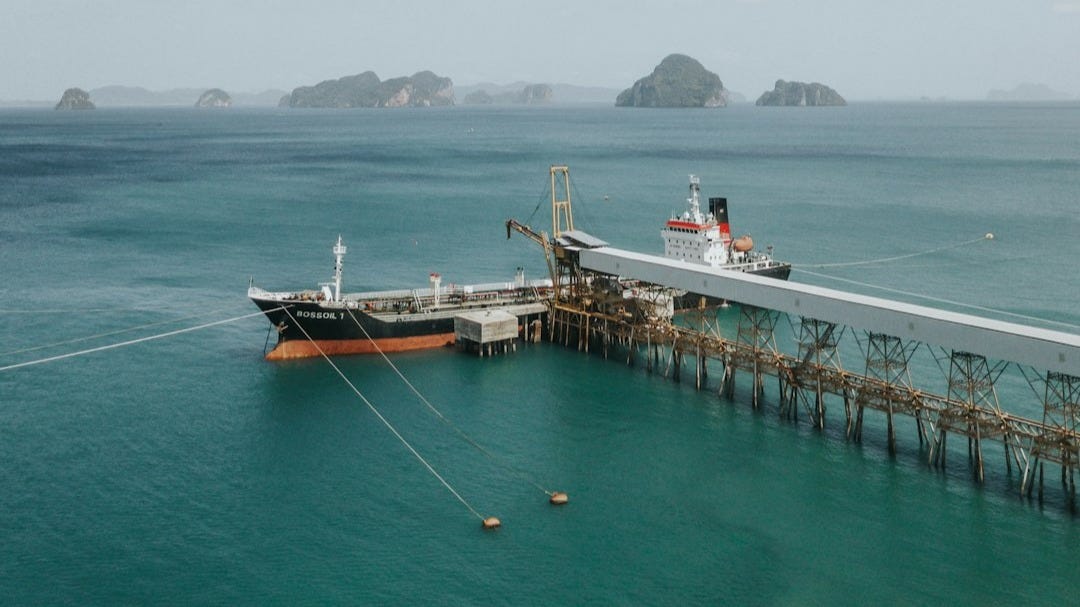Danish Shipping Company Reports Q2 Profit Decline
Maersk Reports Decrease in Q2 Profit Despite High Demand.

Disclaimer: The information contained in this article is for informational purposes only. It reflects the current situation as of the publishing date and is subject to change. The author does not assume any responsibility or liability for any inaccuracies or omissions. The content should not be construed as financial or investment advice.
Real-time information is available daily at https://stockregion.net
A.P. Moeller-Maersk, the Danish shipping conglomerate, has reported a decrease in its net profit for the second quarter of 2024. This announcement comes amid a backdrop of high demand in the container-shipping sector and ongoing global supply-chain disruptions. Despite these market conditions that typically favor shipping companies, Maersk's financial performance did not meet expectations, raising questions about the factors influencing these results.
Financial Performance
In the second quarter, Maersk's net profit fell to $798 million, a decrease from the $1.45 billion recorded in the same period the previous year. This decline represents a 45% drop in net profit year-over-year. Analysts had anticipated lower profits, but Maersk's figures still slightly exceeded the consensus estimates of $781.1 million, as provided by FactSet. The earnings report signals that despite robust demand for container-shipping services, Maersk faced challenges that impacted its profitability. These challenges were not explicitly detailed in the earnings report, but they may be attributed to a combination of rising operational costs, inefficiencies due to supply-chain disruptions, and other external economic factors.
The global container-shipping market has experienced a surge in demand throughout 2024. This increase in demand is primarily driven by the gradual recovery of global trade activities post-pandemic and the continuous growth of e-commerce. Additionally, supply-chain disruptions have led to increased freight rates, which theoretically should benefit shipping companies like Maersk. However, these disruptions also bring about logistical complexities and additional costs.
Supply-chain disruptions have been prevalent due to various factors, including geopolitical tensions, port congestion, labor shortages, and infrastructure limitations. These challenges have created a bottleneck effect, exacerbating delays and increasing operational costs for shipping companies.
Adjustments and Full-Year Guidance
In response to the market conditions and operational challenges, Maersk has made various adjustments. Last week, the company raised its full-year 2024 guidance, citing the persistent supply-chain disruptions in the Red Sea region and strong demand for container-shipping services. This adjustment indicates Maersk's confidence in the continued high demand for its services, despite the operational hurdles it faces. Maersk's plans include investments in technology and infrastructure to improve efficiency and reduce costs. The company has been focusing on digital transformation, aiming to enhance its logistics services through advanced data analytics and automation. These initiatives are expected to streamline operations, reduce delays, and improve customer satisfaction.
Maersk has been expanding its presence in emerging markets, aligning its growth strategy with regions that demonstrate high economic potential. By diversifying its market reach, Maersk aims to mitigate risks associated with regional disruptions and tap into new revenue streams. The broader economic environment also plays a critical role in shaping Maersk's financial performance. Inflationary pressures, fluctuations in fuel prices, and foreign exchange rate variability are some of the external factors affecting the shipping industry. Rising fuel costs, in particular, have a direct impact on operational expenses for shipping companies. To manage these costs, Maersk has been exploring alternative fuel options and investing in energy-efficient vessels.
Economic policies and regulatory changes in key markets can influence trade volumes and shipping demand. Trade agreements, tariffs, and import-export regulations affect the flow of goods across borders, impacting the overall demand for shipping services.
Industry Competitiveness
The container-shipping industry is highly competitive, with numerous players vying for market share. Maersk, being one of the largest shipping companies globally, faces competition from other major players such as MSC (Mediterranean Shipping Company), CMA CGM Group, and Hapag-Lloyd. Competitive pricing, service quality, and operational efficiency are critical factors that determine market leadership.
To maintain its competitive edge, Maersk must continuously innovate and adapt to changing market dynamics. Alliances and partnerships with other logistics providers can enhance service offerings and expand market reach. Additionally, investments in sustainability initiatives are becoming increasingly important as environmental concerns gain prominence. Maersk's commitment to reducing its carbon footprint through sustainable practices can enhance its reputation and attract environmentally conscious customers.
Maersk's future outlook remains cautiously optimistic. The company's ability to navigate the complexities of the global supply chain, manage operational costs, and capitalize on strong demand will be crucial in determining its financial performance. While challenges persist, the initiatives undertaken by Maersk position it well to adapt to evolving market conditions and sustain long-term growth. The ongoing digital transformation and investments in technology are expected to yield positive results in terms of operational efficiency and customer experience. As Maersk continues to expand its global footprint and diversify its market presence, it is poised to leverage opportunities in emerging economies and new trade routes.
In summary, A.P. Moeller-Maersk's second-quarter financial results reflect the multifaceted nature of the container-shipping industry. Despite high demand and favorable market conditions, the company's profitability was affected by a combination of internal and external factors. The strategic adjustments and future outlook indicate Maersk's proactive approach to addressing these challenges and capitalizing on opportunities for growth.
As the global economy continues to recover and evolve, Maersk's ability to adapt and innovate will be essential in maintaining its position as a leading player in the shipping industry.
Disclaimer: This article is intended for informational purposes only and should not be construed as financial or investment advice. The information provided is based on the latest available data and is subject to change. Readers are advised to conduct their own research and consult with financial professionals before making any investment decisions.
Real-time information is available daily at https://stockregion.net


